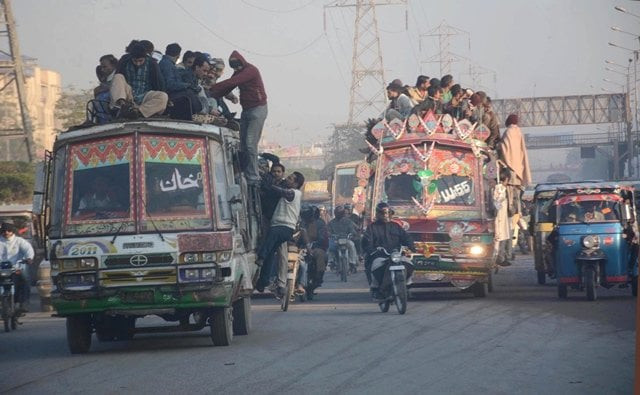Transport fare hike dampens Eid spirits
Passengers going home expected to pay up to 100% more in fares

The exponential increase in petroleum products and the consequent hike in public transport fares have put a damper on the joy of those in the twin cities who are gearing up to leave for their respective hometowns to celebrate Eidul Azha from Thursday (today).
The migrant workers are in for a rude shock as transport fares have increased 100% increase for travel over 100km.
The Regional Transport Authority (RTA) has formed three special squads to take effective action against transporters for overcharging, overloading, over speeding and using faulty vehicles.
A control room has also been set up by RTA and from 9am to 4pm, wherein staff will take action on passengers’ complaints.
The fare of a non-air conditioned (AC) bus from Islamabad to Sahiwal has been increased from Rs800 to Rs1,290, while it has jumped from Rs1,000 to Rs1,440 for an AC bus. Meanwhile, the fare from Islamabad to Bahawalpur has gone up from Rs1,200 to Rs1,890, from Rs200 to Rs350 for Islamabad-Murree, from Rs300 to Rs490 for Islamabad-Peshawar, from Rs1,500 to Rs2,290 for Islamabad-Alipur, from Rs3,000 to Rs3,450 for Islamabad-Hyderabad and from Rs4,000 to Rs6,550 for Islamabad-Karachi. Moreover, an increase of Rs750 in the fare from Islamabad to Sadiqabad has taken the new fare to Rs2,750. Similarly, the Islamabad-DG fare is now Rs2,240 after an increase of Rs240.
Regarding the increase in fares, transporters said that between Eidul Fitr and Eidul Azha this year, diesel prices have gone up by more than Rs100 per litre.
“It is not possible to operate on Eidul Fitr fares now,” they said.
Along with the increase in petroleum products, the prices of tyres, repairs and other spare parts of large vehicles have also gone up sharply. Hence, they cannot carry passengers on old fares.
Transporter Shahbaz Rajput said that the whole cycle of transport changes on Eid. The main reason for this is that vehicles from Rawalpindi to Islamabad are overloaded and go to other cities, but on the way back, the transporters do not get any passenger and empty vehicles return to the bus stands. Thus, one of the main reasons for the increase in fares is that the transporters increase the fares to cover the loss of returning with empty seats.
Meanwhile, the RTA officials said that with the increase in petroleum products, the increase in public transport fares is inevitable.
“However, no one is allowed to charge arbitrary fares on the occasion of Eid,” they said, adding that all public transport union officials have been asked to ensure compliance with government fares.
Published in The Express Tribune, July 7th, 2022.



















COMMENTS
Comments are moderated and generally will be posted if they are on-topic and not abusive.
For more information, please see our Comments FAQ